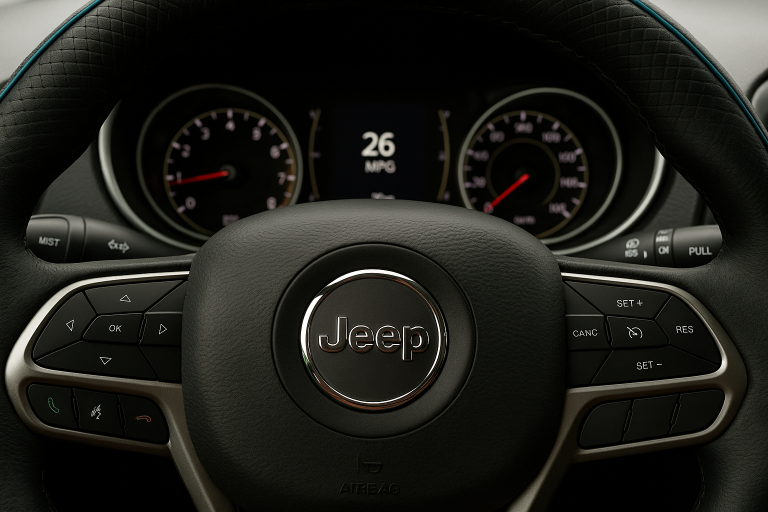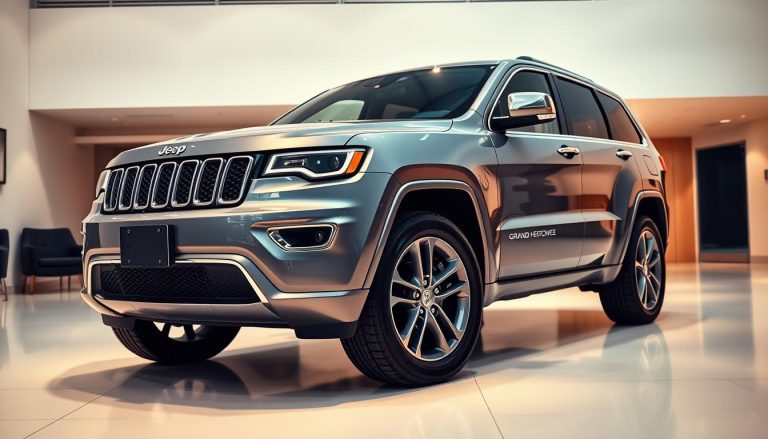Jeep Renegade Gas Mileage: Efficiency Unveiled
The Jeep Renegade stands out in the packed subcompact SUV market. It’s known for both its tough look and good fuel efficiency. Exploring its engine options, real-world mpg ratings, and green features gives a full picture of its gas mileage.
In this article, we’ll uncover what makes the Jeep Renegade fuel efficient. We’ll compare different models and share tips to improve your driving habits for better fuel economy. Join us as we dive into the specs and innovations that highlight the Jeep Renegade as a top pick for those who value efficiency.
Jeep Renegade
In 2015, the Jeep Renegade debuted, expanding the famous brand into the growing subcompact crossover area. It combines tough looks with a small size, winning over many fans. The Renegade, built on Jeep’s “small-wide 4×4 architecture,” mixes city driving ease with off-road skills.
Overview of the Jeep Renegade Model
The jeep renegade model overview reveals a mix of modern style and classic Jeep characteristics. It offers various trim levels for different tastes, from the basic Sport to the adventure-ready Trailhawk. In 2018, a turbocharged engine became an option, boosting power and efficiency.
Historical Context
The jeep renegade history shows Jeep’s aim to attract a wider array of people. As the brand’s first entry into the subcompact crossover market, it added new tech while holding onto its roots. Through time, it got better safety, more advanced entertainment systems, and greener options.
To wrap up, the Jeep Renegade has made a name as a flexible, fashionable, and strong contender in its category. It mirrors Jeep’s rich history and its eye on the future.
Engine Options and Their Impact on Fuel Efficiency
The Jeep Renegade comes with different engines to fit your driving style and needs. These choices matter a lot when you want your car to save on gas. Let’s look closer at these options.
1.3L Turbocharged Inline-4
This engine strikes a balance between power and saving fuel. Thanks to its turbocharge, the 1.3L Inline-4 engine performs well but doesn’t use up too much gas. It’s perfect for drivers who love a fast ride but also want to keep an eye on fuel costs.
2.4L Inline-4 Engine
The 2.4L Inline-4 engine has more power. It gives you more muscle for towing and off-road adventures, but it’s not as good on gas as the smaller engine. Still, it’s a great pick for those who value strength over saving on fuel.
Electric and Hybrid Variants
Jeep now makes electric and hybrid versions of the Renegade for those into green driving. These models use less gas or no gas at all, cutting costs and pollution. They offer a quiet ride and are part of the shift towards better environmental care.
Jeep Renegade’s engine choices help buyers find what they need, whether it’s power, saving fuel, or being environmentally friendly. The introduction of hybrid and electric models shows Jeep’s focus on innovation and caring for the planet.
Jeep Renegade Gas Mileage
Several factors influence Jeep Renegade MPG, including engine choice and how you drive. Smaller engines are typically more fuel-efficient but offer less power. In contrast, bigger engines provide more strength but use more gas per mile.
The Jeep Renegade has different engines, each with unique mileage. The 1.3L turbocharged engine balances power and efficiency, making it a favorite for those who care about miles per gallon. The 2.4L engine, though stronger, uses more fuel.
Driving habits greatly impact Jeep Renegade’s MPG. City driving lowers mileage due to stop-and-go traffic, unlike highway driving, which allows for steady speeds. Features like the automatic engine start-stop system improve gas mileage by saving fuel when the car is idle.
Here’s data showing how different engines perform under various conditions:
| Engine Type | City MPG | Highway MPG | Combined MPG |
|---|---|---|---|
| 1.3L Turbocharged Inline-4 | 24 | 32 | 27 |
| 2.4L Inline-4 | 22 | 30 | 25 |
Awareness of your Jeep Renegade’s MPG is key for making smart buying choices. Choosing the right engine and driving smartly helps you use less fuel.
Comparing Fuel Efficiency Across Model Years
Looking at different years of the Jeep Renegade shows how tech has made them better. This knowledge helps buyers pick the right car for them.
2015-2018 Models
The first models of the Jeep Renegade had strong engines but mixed fuel efficiency. From 2015 to 2018, the 2.4L engine gave good power but used more gas than newer models. Still, people liked the mix of performance and fuel use.
| Model Year | Engine | Fuel Efficiency (MPG city/highway) |
|---|---|---|
| 2015 | 2.4L I-4 | 21/29 |
| 2016 | 2.4L I-4 | 21/29 |
| 2017 | 2.4L I-4 | 21/29 |
| 2018 | 2.4L I-4 | 22/30 |
2019-2023 Models
The newer 2019-2023 models got a lot better at saving gas. They added a 1.3L turbo engine that’s powerful but uses less fuel. They even brought in hybrid versions for even more savings.
| Model Year | Engine | Fuel Efficiency (MPG city/highway) |
|---|---|---|
| 2019 | 1.3L Turbo I-4 | 24/32 |
| 2020 | 1.3L Turbo I-4 | 24/32 |
| 2021 | 1.3L Turbo I-4 | 24/32 |
| 2022 | 1.3L Turbo I-4 | 24/32 |
| 2023 | 1.3L Turbo I-4 | 24/32 |
Real-World MPG Ratings for the Jeep Renegade
Looking at the Jeep Renegade’s fuel efficiency means checking three key sources. We’ll explore official stats, what owners say, and results from independent tests. This gives a full picture of the Jeep Renegade’s fuel usage.
Official Jeep Claims
Jeep says the fuel mileage for the Renegade changes with different engine types. For example, the 1.3L Turbo version gets about 24 MPG in town and 32 MPG on highways. The 2.4L engine version usually does a bit worse. This info helps people think about buying one.
Owner-Reported Figures
The MPG you get with a Jeep Renegade can be different from Jeep’s numbers. Owners often share their real mileage. They say driving styles, how well the car is kept, and where you live can change things. Some say they get about 22 MPG on average, giving a truer picture to those looking to buy.
Third-Party Test Results
Reviews from groups like Edmunds and Consumer Reports add more details. They usually find that the Renegade can hit its MPG promises in perfect conditions. But, in everyday use, you might see numbers from 20 to 30 MPG. This depends on how you drive and the car’s model year.
Eco-Friendly Features of the Jeep Renegade
The Jeep Renegade shines with its green features. It’s built for better fuel efficiency and less harm to our world. Key features include an auto engine start-stop, smart grille shutters, and newer hybrid and electric versions.
Automatic Engine Start-Stop
The automatic engine start-stop is a cool part of the Jeep Renegade. It turns off the engine at full stops and starts it again when you’re ready to go. This cuts down on fuel use, particularly in city drives.
Active Grille Shutters
Active grille shutters are another eco-friendly feature. They open and close to improve air flow. When shut, they lower wind resistance and boost fuel efficiency. This helps keep the engine cool while helping the car slip through the air better.
Hybrid and Electric Models
Jeep now has hybrid and electric Renegade models. They meet the increasing call for sustainable vehicles. Hybrids mix an electric motor with a gas engine for less fuel use and emissions. The all-electric model cuts emissions to zero, making it a top pick for those who care about the planet.
Jeep Renegade vs. Competitors in Fuel Efficiency
When looking at jeep renegade vs competitors fuel efficiency, we find the Renegade among the top subcompact SUVs. It shines due to its MPG ratings and being eco-friendly. This helps users see where it stands against others.
Let’s check how the Jeep Renegade does in fuel efficiency compared to others:
| Model | City MPG | Highway MPG |
|---|---|---|
| Jeep Renegade | 24 | 32 |
| Honda HR-V | 28 | 34 |
| Chevrolet Trax | 26 | 31 |
| Ford EcoSport | 27 | 29 |
| Mazda CX-3 | 29 | 34 |
The table shows the Jeep Renegade has good MPG numbers. Yet, it trails a bit behind some rivals. But, it leads with features like off-roading and spacious interiors valued by many drivers.
In sum, when looking at jeep renegade vs competitors fuel efficiency, think about what’s more important. MPG or other features that match your driving needs better.
Impact of Drivetrain on Gas Mileage
Looking at the Jeep Renegade drivetrain impact on gas mileage, you’ve got to think about FWD and 4WD. Each one has its pros and cons. This knowledge lets drivers choose the best option for their needs.
FWD vs. 4WD
The Jeep Renegade comes in FWD and 4WD. FWD is great for saving fuel. It’s lighter and simpler, perfect for city driving.
4WD, though, offers better control and safety in rough spots. But, it does use more gas. It’s best for those who face tough roads and bad weather.
| Drivetrain | Fuel Efficiency | Best Suited For |
|---|---|---|
| Front-Wheel Drive (FWD) | Higher MPG | City and Highway Driving |
| Four-Wheel Drive (4WD) | Lower MPG | Off-Road and Rough Terrains |
Off-Road Capability vs. Fuel Efficiency
The 4WD Renegade rocks at off-roading. But, this cool feature does lower its MPG. Off-roading takes more power, which means using more fuel.
In the end, choosing the jeep renegade drivetrain impact on fuel efficiency comes down to what you value more. If it’s saving at the pump, then FWD is your friend. For those who love an adventure, and don’t mind spending a bit more on fuel, 4WD is the way to go.
Driving Habits and Their Influence on Gas Mileage
How you drive has a big impact on your Jeep Renegade’s gas mileage. This is true whether you’re in the city, on the highway, or off-road. Your driving habits can help you use less fuel.
City Driving
City driving means a lot of stopping and starting. This can make your car use more gas. Here are ways to use less fuel:
- Avoid rapid acceleration and hard braking.
- Use cruise control when possible to maintain a steady speed.
- Minimize idling by turning off your engine if you expect to wait for an extended period.
Highway Driving
Driving your Jeep Renegade on the highway can be efficient. To get the best gas mileage, follow these tips:
- Maintain a consistent speed, ideally between 50-65 mph.
- Use cruise control to help keep your speed steady.
- Keep windows closed to reduce aerodynamic drag.
Off-Road Situations
Driving off-road is fun but uses more fuel. To save gas in these conditions, do the following:
- Lower your tire pressure slightly to increase traction, but not too much to avoid excess rolling resistance.
- Drive smoothly to avoid sudden bursts of speed and hard braking.
- Avoid heavy loads which can strain the engine and decrease fuel efficiency.
Fuel Efficiency of the Jeep Renegade Trailhawk
The Jeep Renegade Trailhawk excels in off-road adventures and impresses with its fuel efficiency. Its tough build is ready for hard terrains without using too much gas.
Its 1.3L Turbo engine is both powerful and gas-saving. This balance is crucial for off-road trips which usually use more fuel. Jeep has smartly fine-tuned the engine to stay efficient in rough conditions.
Also, the Trailhawk has features to help save fuel. It has an auto start-stop system and a fuel-efficient 4WD drivetrain. These features work well in city drives and off-roads, making it a smart pick for adventurers who care about fuel costs.
Real-world fuel ratings show the Trailhawk is top-notch in its class. Drivers note it keeps up good MPG even in tough situations. This shows its design is well-thought-out and effective.
The Trailhawk’s design also aids in saving fuel. Its active grille shutters manage airflow to cut drag and boost efficiency. This mix of smart tech and solid engineering is why it’s popular among those who love off-roading but also value fuel economy.
Overall, the Jeep Renegade Trailhawk’s fuel efficiency is a strong mix of adventure readiness and smart gas use. It’s a prime choice for those who enjoy exploring without overlooking fuel expenses.
Tips for Optimizing Your Jeep Renegade Gas Mileage
If you own a Jeep Renegade, you can make it more fuel-efficient. Just follow these handy tips. They cover everything from routine upkeep to driving smarter. Let’s dive into how you can save on fuel with maintenance, tire care, and driving wisely.
Regular Maintenance
Keeping your Jeep in shape is key to using less fuel. Make sure to get regular oil changes, check the air filter, and inspect spark plugs. A well-maintained engine means better gas mileage.
Proper Tire Inflation
Did you know correct tire pressure can save gas? When tires are low, your Jeep works harder, burning more fuel. Check your tire pressure often and follow the Jeep’s guidelines to keep them perfect.
Efficient Driving Practices
How you drive affects your fuel use. Try to avoid speeding up fast and stopping suddenly since it wastes fuel. Keeping a consistent speed, using cruise control when you can, and reducing idle time helps your Jeep run more efficiently and saves gas.
The Role of Technology in Enhancing Fuel Efficiency
Advanced technology has made the Jeep Renegade more fuel-efficient. High-tech features make driving comfortable and modern. They also help save fuel. Let’s look at the specific technologies that do this.
Infotainment System’s Contribution
The Jeep Renegade’s infotainment system helps save fuel. It has navigation and real-time traffic updates. This means drivers can avoid traffic and save fuel. The system also reminds you when your car needs maintenance. This keeps the car running well, which saves gas.
Driver Assistance Features
Driver assistance features also improve the Jeep Renegade’s fuel efficiency. Features like adaptive cruise control and lane-keeping assist make driving smoother. They avoid sudden stops and starts that waste fuel. These technologies help keep your drive smooth and save gas.
Benefits of the Jeep Renegade e-Hybrid
The Jeep Renegade e-Hybrid is great for drivers who care about the environment. It lets you be green and save money. It’s a smart choice for both the earth and your pocket.
Lower CO2 Emissions
The Jeep Renegade e-Hybrid gives off much less CO2 than regular gas cars. This is better for our planet. Choosing this car means you help reduce pollution and make the air cleaner.
Tax Benefits
The Jeep Renegade e-Hybrid also offers tax breaks. These depend on where you live, but can lower the cost of buying a hybrid. You end up saving money when you buy this car.
Here’s a quick comparison of potential tax benefits by category:
| Category | Benefit |
|---|---|
| Federal Tax Credit | Up to $7,500 |
| State Incentives | Varies by state |
| Local Rebates | Varies by locality |
| Total Potential Savings | Significant, depending on eligibility |
The Jeep Renegade e-Hybrid is not just about saving on gas. You also get tax breaks and help the environment. It’s a great choice for those thinking of the future.
Cost of Ownership: Fuel Savings in the Long Term
When you think about the cost of ownership Jeep Renegade, how much you spend on fuel matters a lot. By checking how much gas the car uses, you can predict big savings as the years go by. It’s crucial to know how fuel savings can help your budget in the long run.
The Jeep Renegade is designed to use less gas, offering engines that are both powerful and save you money on fuel. Let’s look at how saving on gas can lower the total cost of having a Jeep Renegade:
| Model Year | Average MPG | Annual Fuel Cost | 5-Year Fuel Cost |
|---|---|---|---|
| 2019 | 27 | $1,500 | $7,500 |
| 2020 | 28 | $1,450 | $7,250 |
| 2021 | 29 | $1,400 | $7,000 |
Newer models of the Jeep Renegade use less fuel, which means the cost of ownership Jeep Renegade goes down. Knowing these savings helps see the value of a car that uses gas efficiently.
Buying a Jeep Renegade means you’re in for fun drives and saving on fuel. Keep an eye on the MPG of each model to plan your expenses better. After all, knowing about fuel savings is a big part of understanding the full cost of ownership Jeep Renegade.
Jeep Renegade Fuel Tank and Range
To get the best out of the Jeep Renegade, know its fuel tank size and how far it can go. This info helps when planning long trips, making sure your journey is fuel-efficient.

Fuel Tank Capacity
The Jeep Renegade’s fuel tank size changes a bit, depending on the model. Most models have a 12.7-gallon tank. This size is good for city and highway driving, letting you go a long way before needing gas.
Estimating Range Per Tank
Figuring out how far you can go on a tank means looking at two things: how big the tank is and your miles per gallon. If the Jeep Renegade gets 25 mpg on average, we can guess how far it will go.
| Drive Type | Fuel Tank Capacity (gallons) | Estimated Range (miles) |
|---|---|---|
| Front-Wheel Drive | 12.7 | 317.5 |
| All-Wheel Drive | 12.7 | 300 |
| Trailhawk 4WD | 12.7 | 285 |
These numbers help plan your trips, showing what the Jeep can do. With a 12.7-gallon tank, you’re set for city streets and wild trails.
Warranty and Maintenance for Fuel-Efficiency
Getting the best fuel efficiency in your Jeep Renegade involves more than just your driving habits. It also includes handling your vehicle’s warranty and maintenance properly. The Jeep Renegade warranty and maintenance plans are packed with benefits. They help keep your vehicle running smoothly.
Jeep Wave Program
The Jeep Wave Program is a top-notch customer care plan that offers exclusive benefits. This includes hassle-free maintenance for new Jeep Renegade owners. It covers routine services like oil changes and tire rotations. Jeep Wave members also get priority customer support. This shows how reliability and fuel efficiency are connected.
Standard and Extended Warranties
The Jeep Renegade comes with both standard and extended warranties that help ensure consistent fuel efficiency. The standard warranty covers three years or 36,000 miles. It focuses on essential components that influence fuel performance. With an extended warranty, your coverage is broader, protecting you against surprise repairs that might lower your gas mileage.
Having constant access to authorized service centers through your Jeep Renegade warranty maintenance keeps your vehicle in top shape. This thoughtful approach emphasizes the importance of sticking to regular maintenance. It also shows how using warranty services can keep your fuel efficiency high over time.
Conclusion
This jeep renegade mpg overview showed the important parts that affect fuel efficiency. It talked about different engines and how drivetrains impact gas mileage. We learned how real-world MPG numbers and tests are more telling than just official claims.
The article highlighted Jeep’s efforts in making greener vehicles. Features like the Automatic Engine Start-Stop system and Active Grille Shutters were mentioned. It also talked about hybrid and electric options. Plus, it shared useful tips for better gas mileage, like regular car check-ups and efficient driving.
Overall, the Jeep Renegade shines not just in how it drives and handles off-road, but also in its fuel efficiency. This overview pointed out why it’s a smart pick for those who want a car that’s good for the planet and their wallet. It mixes innovation, smart features, and a care for the environment.
FAQs
What is the gas mileage of the Jeep Renegade?
The Jeep Renegade’s gas mileage depends on the engine type and whether it’s FWD or AWD. The 1.3L Turbo engine gets up to 24 MPG in the city and 32 MPG on the highway if it’s FWD. The 2.4L engine gets a bit less.
How does the 1.3L Turbocharged Inline-4 engine impact fuel efficiency?
The 1.3L Turbo engine helps the Jeep Renegade use less gas, especially on the highway. It offers up to 32 MPG on the highway for FWD models. It’s a good pick if you want to save on fuel.
Are there electric or hybrid versions of the Jeep Renegade available?
Yes, Jeep has made hybrid Renegades. They use less fuel and emit less CO2. This makes them better for the environment.
How does the fuel efficiency of the Jeep Renegade compare by model year?
Newer Jeep Renegades (2019-2023) are more fuel-efficient than older ones (2015-2018). Jeep has added new engines and tech to save gas.
What are owners reporting about the real-world MPG for the Jeep Renegade?
Owners say their MPG is close to Jeep’s claims. Yet, it can change based on how and where you drive. Some get slightly less than the EPA numbers.
What eco-friendly features does the Jeep Renegade offer?
Jeep’s Renegade has green features like engine start-stop, active grille shutters, and hybrid models. These help cut fuel use and CO2 emissions.
How does the fuel efficiency of the Jeep Renegade compare to its competitors?
The Renegade’s MPG is good for a small SUV. Some rivals do a bit better. Yet, the Renegade also offers great off-road features and many other benefits.
How do driving conditions affect the fuel economy of the Jeep Renegade?
Fuel economy changes with how you drive. City driving lowers MPG because of stop-and-go traffic. Highway driving is better for MPG. Off-roading uses more fuel too.
What are some practical tips for optimizing the Jeep Renegade’s gas mileage?
To get the best gas mileage in your Jeep Renegade, do these things:
1. Keep up with regular car check-ups, like oil changes.
2. Make sure your tires are well-inflated.
3. Drive gently and avoid idling when you can.






